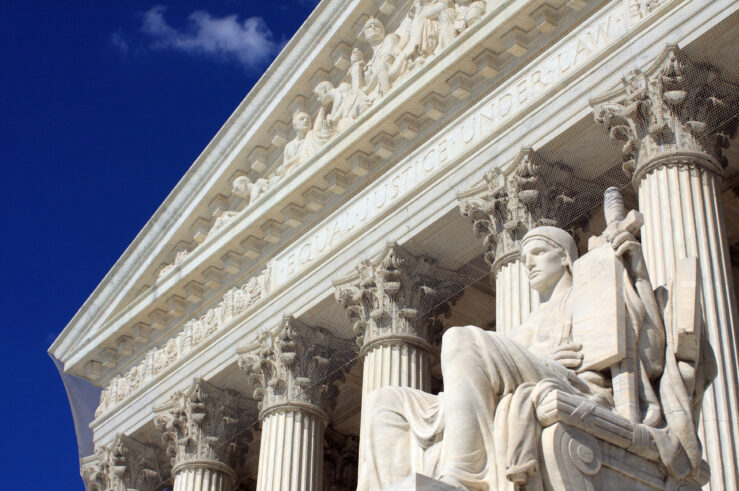Showing archive for: “Patents”
The Supreme Court Misses the Big Consumer Welfare Picture in NCAA v. Alston
In its June 21 opinion in NCAA v. Alston, a unanimous U.S. Supreme Court affirmed the 9th U.S. Circuit Court of Appeals and thereby upheld a district court injunction finding unlawful certain National Collegiate Athletic Association (NCAA) rules limiting the education-related benefits schools may make available to student athletes. The decision will come as no ... The Supreme Court Misses the Big Consumer Welfare Picture in NCAA v. Alston
NY ‘Abuse of Dominance’ Bill Attacks Consumer Welfare and the US Antitrust Tradition
U.S. antitrust law is designed to protect competition, not individual competitors. That simple observation lies at the heart of the Consumer Welfare Standard that for years has been the cornerstone of American antitrust policy. An alternative enforcement policy focused on protecting individual firms would discourage highly efficient and innovative conduct by a successful entity, because ... NY ‘Abuse of Dominance’ Bill Attacks Consumer Welfare and the US Antitrust Tradition
Bad Blood at the FTC
John Carreyrou’s marvelous book Bad Blood chronicles the rise and fall of Theranos, the one-time Silicon Valley darling that was revealed to be a house of cards.[1] Theranos’s Svengali-like founder, Elizabeth Holmes, convinced scores of savvy business people (mainly older men) that her company was developing a machine that could detect all manner of maladies from ... Bad Blood at the FTC
The Future of FTC Equitable Monetary Relief after AMG Capital Management
The U.S. Supreme Court’s just-published unanimous decision in AMG Capital Management LLC v. FTC—holding that Section 13(b) of the Federal Trade Commission Act does not authorize the commission to obtain court-ordered equitable monetary relief (such as restitution or disgorgement)—is not surprising. Moreover, by dissipating the cloud of litigation uncertainty that has surrounded the FTC’s recent ... The Future of FTC Equitable Monetary Relief after AMG Capital Management
The Problem of Data Property Rights
Policy discussions about the use of personal data often have “less is more” as a background assumption; that data is overconsumed relative to some hypothetical optimal baseline. This overriding skepticism has been the backdrop for sweeping new privacy regulations, such as the California Consumer Privacy Act (CCPA) and the EU’s General Data Protection Regulation (GDPR). ... The Problem of Data Property Rights
Platform Self-Preferencing Can Be Good for Consumers and Even Competitors
Critics of big tech companies like Google and Amazon are increasingly focused on the supposed evils of “self-preferencing.” This refers to when digital platforms like Amazon Marketplace or Google Search, which connect competing services with potential customers or users, also offer (and sometimes prioritize) their own in-house products and services. The objection, raised by several ... Platform Self-Preferencing Can Be Good for Consumers and Even Competitors
How Antitrust Regulators Could Use the ‘Perpetual Inventory Method’ to Value R&D
The slew of recent antitrust cases in the digital, tech, and pharmaceutical industries has brought significant attention to the investments many firms in these industries make in “intangibles,” such as software and research and development (R&D). Intangibles are recognized to have an important effect on a company’s (and the economy’s) performance. For example, Jonathan Haskel ... How Antitrust Regulators Could Use the ‘Perpetual Inventory Method’ to Value R&D
How FTC v. Qualcomm Led to the Nvidia-Arm Acquisition
In a constructive development, the Federal Trade Commission has joined its British counterpart in investigating Nvidia’s proposed $40 billion acquisition of chip designer Arm, a subsidiary of Softbank. Arm provides the technological blueprints for wireless communications devices and, subject to a royalty fee, makes those crown-jewel assets available to all interested firms. Notwithstanding Nvidia’s stated ... How FTC v. Qualcomm Led to the Nvidia-Arm Acquisition
The DOJ’s Antitrust Case Against Google: A Tough Slog, but Maybe an Intriguing Possibility?
The U.S. Department of Justice’s (DOJ) antitrust case against Google, which was filed in October 2020, will be a tough slog.[1] It is an alleged monopolization (Sherman Act, Sec. 2) case; and monopolization cases are always a tough slog. In this brief essay I will lay out some of the issues in the case and raise ... The DOJ’s Antitrust Case Against Google: A Tough Slog, but Maybe an Intriguing Possibility?
The Forgotten Strand of the Anti-Monopoly Tradition in Anglo-American Law
Admirers of the late Supreme Court Justice Louis Brandeis and other antitrust populists often trace the history of American anti-monopoly sentiments from the Founding Era through the Progressive Era’s passage of laws to fight the scourge of 19th century monopolists. For example, Matt Stoller of the American Economic Liberties Project, both in his book Goliath ... The Forgotten Strand of the Anti-Monopoly Tradition in Anglo-American Law
COVID-19 Vaccines Show the Patent System Works
With the COVID-19 vaccine made by Moderna joining the one from Pfizer and BioNTech in gaining approval from the U.S. Food and Drug Administration, it should be time to celebrate the U.S. system of pharmaceutical development. The system’s incentives—notably granting patent rights to firms that invest in new and novel discoveries—have worked to an astonishing ... COVID-19 Vaccines Show the Patent System Works
Geo-Blocking: What is it Good For… A Surprising Amount, Actually.
The European Court of Justice issued its long-awaited ruling Dec. 9 in the Groupe Canal+ case. The case centered on licensing agreements in which Paramount Pictures granted absolute territorial exclusivity to several European broadcasters, including Canal+. Back in 2015, the European Commission charged six U.S. film studios, including Paramount, as well as British broadcaster Sky ... Geo-Blocking: What is it Good For… A Surprising Amount, Actually.













